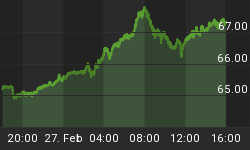Through the ups and downs of the stock market over the last 3 months, there has been one constant: the Dollar Index has gone down. This is surprising as the Dollar has barely managed a bounce following a very strong up move from November, 2009 to June, 2010. Even its safe haven status in times of market turbulence is now in question as traders have moved on to the Swiss Franc or Japanese Yen.
The weakness in the Dollar Index is understandable as the Federal Reserve is hell bent on Dollar devaluation and apparently, the FOMC is targeting an inflation level. As expected, Dollar weakness has led to strength in gold, which is at new highs, but the stock market really hasn't caught fire. While I personally disagree with the policy to have my purchasing power diminished, Dollar devaluation has led to asset inflation over the past couple of years. Stocks are not immune from this and equities have performed very nicely while the Dollar was trending lower.
The relative lack of performance in equities over the past 3 months makes one wonder if this policy of Dollar devaluation has lost its effect. In other words, is the Fed pushing on a string? The declining Dollar over the past 3 months really has not had an effect on equity prices, which are at levels seen in January, 2010 and in June, 2010. We know that a rising Dollar is unlikely to be good for stocks and now it appears that a falling Dollar doesn't matter either.
For the record, figure 1 is a weekly chart of the Dollar Index. Key pivot points (areas of buying and selling) are noted on the chart. Longer term indicators and studies (not shown) suggest that the Dollar Index has the potential to be in a sustainable up trend that would be a continuation of the move earlier in the year, but the price action suggests that we are in a down trend as prices are below prior support levels.
Figure 1. Dollar Index/ weekly















